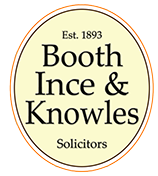
Will My Estate be liable to pay Inheritance Tax?
Lewis Thompson Associate Solicitor at Booth Ince and Knowles Solicitors discusses Probate and when you are required to pay Inheritance Tax in a deceased Estate.
What is Inheritance Tax?
Inheritance Tax is tax payable to HMRC on someone’s death. The tax is based on the date of death values of all assets held by the deceased at the date of their passing.
In most circumstances Inheritance Tax must be paid by an estate within six months of the date of the deceased person’s death. If the Inheritance Tax is still payable after this time, interest may need to be paid to HMRC on the tax owed.
Generally speaking Inheritance Tax is charged at 40% after the application of the Nil Rate Band, Residential Nil Rate Band and other allowances if applicable.
Do all estates have to pay Inheritance Tax?
Not all estate have to pay Inheritance Tax. Put simply, Inheritance Tax will not be payable if the deceased estate is worth less than £325,000. This £325,000 threshold is known as the Nil Rate Band. The Nil Rate Band is an allowance set by the government (HMRC) whereby Inheritance Tax does not need to be paid. Generally speaking, if a deceased’s estate is worth less than £325,000, it will not be liable to pay Inheritance Tax.
The Nil Rate Band will be fixed at £325,000 until April 2028.
Will my estate have to pay Inheritance Tax if I’m leaving my estate to my spouse?
If you are married, any gifts from your estate to your spouse will not be treated as part of your estate for Inheritance Tax purposes.
The same principle applies if you are leaving any gifts to charity. Provided that the charity is a registered charity and recognised by HMRC as an accepted charity any charitable gifts under your Will to your chosen charity will be treated as exempt from your estate.
Any gifts from your estate not paid to your spouse and/or a charity will be treated as taxable and will therefore come off your Nil Rate Band Allowance of £325,000 as described above.
What if I die first, can my spouse benefit from my Nil Rate Band?
As described above, any gifts to your spouse out of your estate are tax free. On the second death of you both your deceased spouse’s estate will have the availability of their own Nil Rate Band plus any unused Nil Rate Band that can be obtained from your estate.
Effectively, your Nil Rate Band is ‘transferred’ for the benefit of your surviving spouse upon their death. On the second death of you both therefore, you can have up to £650,000 (£325,000 x 2) tax free allowance if your spouse dies and your allowance was unused on your death before your spouse’s death.
What is the Residential Nil Rate Band and how much is it?
The Residential Nil Rate Band was introduced by the government in 2017 and is currently set at £175,000. Put simply, the RNRB is an additional amount available to estates whereby the deceased’s main place of residence is being gifted to direct (lineal) descendants (their children/grandchildren). The Residential Nil Rate Band is separate from the standard Nil Rate Band described above.
The tax rules concerning Residential Nil Rate Band are not simple and can be problematic. Therefore, it is important that you speak with a solicitor should you wish to utilise this extra allowance. If you are looking to draft a Will, you should speak with your solicitor about the availability of this threshold to be sure of its availability to your family upon your death.
Can the Residential Nil Rate Band be Transferred?
Yes, as with the standard Nil Rate Band above, any unused Residential Nil Rate can also be utilised on the second death of a married couple.
The effect of the Nil Rate Band and Residential Nil Rate Band transferred on the second death is that an estate can have up to £1,000,000 Inheritance Tax free allowance available. As mentioned, though you must ensure that you properly plan for this availability in your lifetime to avoid any confusion following your death.
Can I obtain a Grant of Probate or Letters of Administration without paying Inheritance Tax?
For the purposes of obtaining Probate in an estate you must finalise any Inheritance Tax owed with HMRC or make arrangements with them for the payment of the tax first before you can obtain a Grant of Probate or Letters of Administration. When you submit your Inheritance Tax return to HMRC, HMRC will provide you with confirmation of the tax paid or the tax still payable and thereafter they will notify the court of your return and authorise the release of the Grant of Probate/Letters of Administration to the Executors or Personal Representatives of your estate.
What if there isn’t any money available in the estate to pay any Inheritance Tax?
If there isn’t any money available in the estate to pay the Inheritance Tax, your solicitor can assist you with requesting the monies from any closed bank accounts in the estate. Whilst some banks will not release monies until they are in receipt of Probate, they can pay monies directly to HMRC for Inheritance Tax Purposes. Similarly, you can do this for the payment of Funeral costs as well.
Inheritance Tax can be a difficult area to navigate when dealing with a deceased estate. Whilst the above information is correct at the time of writing, it should be noted that all estates are different and that some of the information above may not be applicable in all circumstances. You should always look to consult with a solicitor to discuss Probate and Inheritance Tax if you are unsure. This can avoid any future complications that may arise.
If you wish to discuss any of the above issues you can contact Lewis Thompson at Booth Ince and Knowles Solicitors to arrange an appointment and discuss further on 0161 368 2134 alternatively lewis@boothinceandknowles.com

